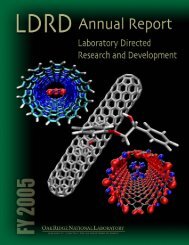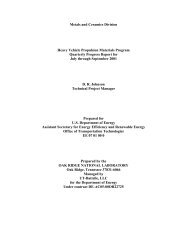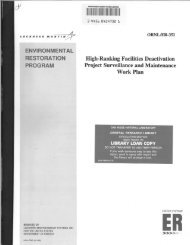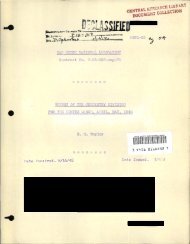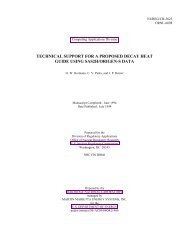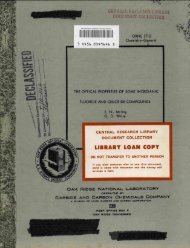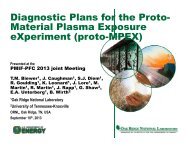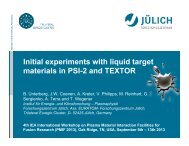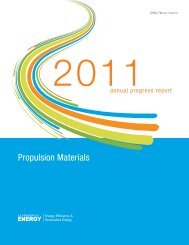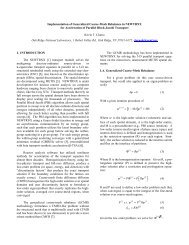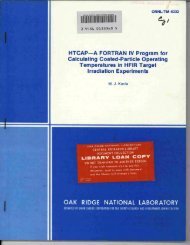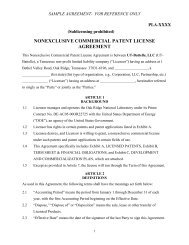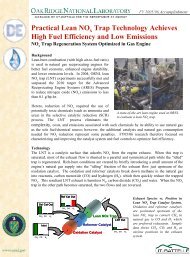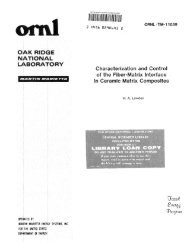FY2010 - Oak Ridge National Laboratory
FY2010 - Oak Ridge National Laboratory
FY2010 - Oak Ridge National Laboratory
Create successful ePaper yourself
Turn your PDF publications into a flip-book with our unique Google optimized e-Paper software.
Director’s R&D Fund—<br />
Ultrascale Computing and Data Science<br />
“Computational Studies of Nanomaterials for Energy Storage Applications,” YESS, Saclay, France (2009).<br />
“Why Do We Need Large-scale Simulations in Nanoscience Anyway?” colloquium at LSU, Baton Rouge<br />
LA (2009).<br />
“Carbon nanostructures for energy storage and nanoelectronics applications,” colloquium at NCSU,<br />
Raleigh, NC (2009).<br />
“Capacitor Models for Various Regimes, Carbons, and Electrolytes,” the 2009 Advanced Automotive Battery<br />
and Capacitor Conference (AABC-09), Long Beach, CA (2009).<br />
“Theoretical Model of Nanoporous Carbon Supercapacitors,” the 64 th American Chemical Society<br />
Southwest Regional Meeting (SWRM), Little Rock, AR (2008).<br />
“A Universal Model of Nanoporous Carbon Supercapacitors,” the International Conference on the Theory<br />
and Applications of Computational Chemistry, Shanghai, China (2008).<br />
05274<br />
Inferring and Predicting the Social Dynamics of Groups<br />
via Psycho-Textual and Communications Flow Analysis<br />
Jack Schryver, Edmon Begoli, Yu Jiao, and Tracy Warren<br />
Project Description<br />
The goal of this project is to develop a new capability in social network analysis using electronic<br />
communications data that can be analyzed with text analysis techniques. We extend traditional social<br />
networking analysis by including deep-dive analysis of message contents to obtain inferences of group<br />
processes. We consider group formation, recruitment, coalition, threat, conflict, and schism. Important<br />
indicators such as in-group bias and out-group antipathy are rarely coded explicitly in text. Instead, they<br />
are embedded in connotative/affective meanings. Semantic analysis has generally focused on denotative<br />
meaning, creating a huge potential for knowledge discovery. Most related research is in the field of<br />
sentiment analysis–detection of positive/negative orientations toward a predetermined subject. Our work<br />
departs from previous work in three main directions. First, we perform a more fine-grained analysis,<br />
narrowing the focus from document to sentence level and from pure sentiment to 22 affective states.<br />
Second, we integrate common sense affective knowledge. Third, we link affect with entities identified in<br />
documents for deeper understanding of affective meaning. This capability will be an indispensible aid for<br />
improving our nation’s ability to protect itself from terrorism, and has the potential to reshape the way<br />
information about individual interactions is stored and analyzed.<br />
Mission Relevance<br />
This research extends ORNL's Knowledge Discovery mission objective. In addition, this research is<br />
directly aligned with the mission of the Intelligence Advanced Research Projects Activity (IARPA), the<br />
Intelligence Community (IC), and the Department of Homeland Security (DHS). These agencies need<br />
innovative and reliable tools to help them analyze the deep contents of massive quantities of electronic<br />
messaging data (e-mail, text chat, blogs, and transcribed talk). This research will help establish a<br />
capability that is essential for long-term human factors analysis and intelligence analysis (DHS), socialnetwork<br />
analysis (IC), and computational and psycholinguistics (IARPA). With internationally<br />
recognized experience and expertise in knowledge discovery and data mining, high-performance<br />
computing, human factors, social networking technology, and geospatial sciences, ORNL is strategically<br />
positioned to develop this capability.<br />
78



